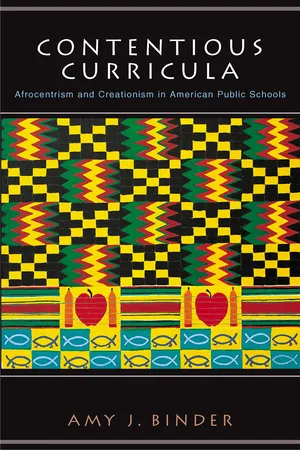
Princeton Studies in Cultural Sociology
Afrocentrism and Creationism in American Public Schools
- 320 pages
- English
- ePUB (mobile friendly)
- Available on iOS & Android
Princeton Studies in Cultural Sociology
Afrocentrism and Creationism in American Public Schools
About This Book
This book compares two challenges made to American public school curricula in the 1980s and 1990s. It identifies striking similarities between proponents of Afrocentrism and creationism, accounts for their differential outcomes, and draws important conclusions for the study of culture, organizations, and social movements.
Amy Binder gives a brief history of both movements and then describes how their challenges played out in seven school districts. Despite their very different constituencies--inner-city African American cultural essentialists and predominately white suburban Christian conservatives--Afrocentrists and creationists had much in common. Both made similar arguments about oppression and their children's well-being, both faced skepticism from educators about their factual claims, and both mounted their challenges through bureaucratic channels. In each case, challenged school systems were ultimately able to minimize or reject challengers' demands, but the process varied by case and type of challenge. Binder finds that Afrocentrists were more successful in advancing their cause than were creationists because they appeared to offer a solution to the real problem of urban school failure, met with more administrative sympathy toward their complaints of historic exclusion, sought to alter lower-prestige curricula (history, not science), and faced opponents who lacked a legal remedy comparable to the rule of church-state separation invoked by creationism's opponents.
Binder's analysis yields several lessons for social movements research, suggesting that researchers need to pay greater attention to how movements seek to influence bureaucratic decision making, often from within. It also demonstrates the benefits of examining discursive, structural, and institutional factors in concert.
Frequently asked questions
Information
Table of contents
- Table of Contents
- Preface
- One Introduction to Afrocentrism and Creationism, Challengers to Educational “Injustice”
- Two The Challengers
- Three History of the Three Afrocentric Cases: Atlanta, Washington, D.C., and New York State
- Four Cultural, Political, and Organizational Factors Influencing Afrocentric Outcomes
- Five History of the Four Creationist Cases: Louisiana State, California State, Vista, California, and Kansas State
- Six Cultural, Political, and Organizational Factors Influencing Creationist Outcomes
- Seven Making More Institutional the Study of Challenge
- Appendix
- Notes
- References